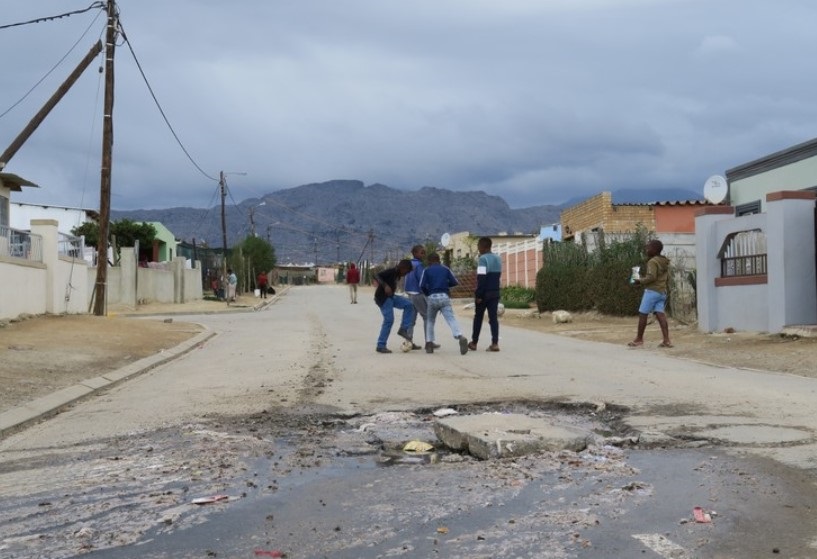
- At least 32 people have died of cholera - a preventable and treatable disease - this year.
- The water in more than half the supply systems examined for the Department of Water and Sanitation's latest Blue Drop Watch Report is unfit to drink.
- A group of senior scientists has warned of a national health and environmental emergency.
A deadly combination of sewage in streets and rivers, and dirty drinking water - or no water - in the taps is common to all four areas where people have died of cholera in the last two months.
In Hammanskraal, the cholera epidemic had claimed the lives of 29 people, according to health department spokesperson Foster Mohale.
The Free State towns of Parys and Kroonstad, and Phake in Mpumalanga have each reported one death attributed to cholera. These are likely underestimates of the actual cholera deaths.
The water supply systems in Hammanskraal, Parys and Phake are among the failing systems inspected by the Department of Water and Sanitation for its Blue Drop Watch Report released on 6 June.
The drinking water in these towns is contaminated by faecal bacteria such as E. coli. ![]()
READ | Tshwane, water and sanitation dept to resolve metro's water woes to tune of R4bn
The bacterium which causes cholera, vibrio cholerae, is also transmitted by faecal contamination of water and food.
The report provides a technical overview of the country's drinking water supply, ahead of the full Blue Drop Report 2023 expected to be published in July.
Of the 1 186 water supply systems in South Africa, the watch report assessed 151.
Of these, 77 are failing, including those supplying drinking water to Hammanskraal, Parys and Phake.
The Kroonstad water supply system is not included in the report, but information on the department’s Integrated Regulatory Information System (IRIS), which is used as a database informing the report, shows the Kroonstad system is also failing.
Scientists warn of looming health emergency
The cholera deaths in Gauteng, the Free State and Mpumalanga are symptomatic of a widespread collapse of water and sanitation infrastructure.
Immediate action needs to be taken by authorities.
This is the warning from a group of 15 senior academic experts forming South Africa's Scientific Advisory Group on Emergencies (SAGE).
On 6 June, the same day the department released the report, SAGE released its Strategic Advisory on Wastewater Management in South Africa.
In it, the scientists stated if left unchecked, the "unfolding collapse" of water treatment works countrywide "could precipitate multiple concurrent health and environmental emergencies".
SAGE listed 17 actions that need to be taken to reverse the country's present and looming health crisis due to polluted drinking water.
Among the recommendations are that the report - an evaluation of water supply systems throughout the country - be published annually.
The last report was published in 2014.
Most of the other recommendations are technical and legislative in nature and include amending the Water Services Act to empower the department to take over technical functions and revenue collection of failing water suppliers, such as municipalities and water boards, as provided for in Section 139 of the Constitution.
In October last year, then-department spokesperson Ratau Sputnik told GroundUp unlike legislation covering, for example, wastewater polluting the environment, there was no such provision related to drinking water.
Sputnik said the only way the minister of water and sanitation could currently intervene was by invoking Section 139 of the Constitution.
Questions sent to the department asking whether any legislative review of the Water Services Act was underway, or whether it had intervened through a Section 139 process received no response.
Impact of failing sewage treatment of drinking water
In Hammanskraal, the Temba water treatment work supplies the area. It extracts raw water from the Leeukraal Dam fed by the Apies River.
But upstream, the Apies River receives what is supposed to be treated sewage from two large sewage treatment plants - Rooiwal East and Rooiwal North.
These two sewage plants, which department data shows have so far this year almost completely failed to reduce the number of faecal bacteria in received sewage, together release 200 million litres of effluent into the Apies River per day.
Rooiwal East's microbiological compliance - when the amount of faecal bacteria in effluent released into the river is not above 1 000 colony forming units per 100ml - is just 5% over the last 12 months.
Rooiwal North, the larger of the two with a capacity of 150 million litres a day, reflects 0% microbiological compliance.
Minimum compliance to be considered "good" for sewage effluent is 70%.
The department had stated pollution of the Apies River by the Rooiwal sewage treatment plants was the most likely cause of the cholera outbreak in Hammanskraal.
In its statement on plans to set up a water purification package plant managed by Magalies Water, the department stated the pollution of the Leeukraal Dam was so bad the Temba water treatment works was unable to treat the raw water to acceptable drinking water standards.
The report noted the Temba water treatment works distributed water with a microbiological compliance of 85% against a minimum compliance level of 95%.
It also fails the chemical compliance, achieving just 80% against a minimum 95%.
Tshwane mayoral spokesperson Sipho Stuurman said the source of the cholera in Hammanskraal had not yet been detected and referred to a Council for Scientific and Industrial Research (CSIR) report of 1 June stating no cholera was detected in any of Tshwane's water supply systems.
READ | Trucks parked next to 'dirty' water do not belong to City of Tshwane - spokesperson
The report noted "an environmental strain of vibrio cholerae was detected" in water from the Leeukraal Dam prior to treatment at the Temba water treatment works, although this strain "does not carry the genes that code for cholera toxin and therefore cannot cause epidemic cholera. This strain is not the cause of the current outbreak".
But epidemiologist and senior lecturer emeritus at Stellenbosch University's department of global health Dr Jo Barnes said they were looking in the wrong places.
Barnes added other than the raw water in Leeukraal Dam, the CSIR tested water in supply systems that had already been treated.
She said they needed to test "environmental water", such as in the sewage running down the streets in the area.
It also needed to be considered that people were collecting water from water tankers and there was a potential chain of contamination from the bucket filled at the water tanker to the water being scooped into a pot in the home.
People had to walk through sewage-contaminated streets and the cholera bacteria could easily be walked into people's homes, and water standing in a bucket could become contaminated.
Also, Barnes added, trying to find how the first cholera bacterium got into Hammanskraal was a red herring when the problem was sewage pollution and a failing drinking water supply system.
Parys
In Parys, where there has been one reported death due to cholera, the water supply system run by the Ngwathe Local Municipality scored nil for microbiological and chemical compliance in the report.
It noted this indicated no water quality testing data was supplied to the department's regulatory system, as it was mandated to do.
But in parts of town, particularly Parys' township, there had been no water in the taps for two years or more, according to Phehellang Secondary School principal Dimakotso Maloyi.
Maloyi said township residents collected water from people in town who had boreholes, or from institutions with boreholes, such as Phehellang Secondary.
She added the municipality did not even supply water via water trucks, and there had been more than one violent protest over water provision so far this year.
Maloyi said she saw some of the most poverty-stricken residents collected water for domestic use from the Vaal River, which is known to be highly polluted by sewage from Emfuleni, and from Parys' own sewage treatment plant.
The department regulatory system showed the sewage treatment works had 0% microbiological and 0% chemical compliance over the last 12 months. With not even the basic water quality tests taking place.
Achieving a Green Drop 2022 score of just 7%, it is a critically failing sewage plant, releasing up to 4.7 million litres of untreated sewage into the Vaal River per day.
The Green Drop Report stated: "Zero monitoring of water quality is performed, very little flow records are available, and several spillages are evident due to overflowing manholes and poorly maintained pump stations."
It noted the failure of sewage treatment works in the Ngwathe Local Municipality had "disastrous consequences for the environment and end-users".
Phakwe
A 73-year-old woman from Phakwe, a small town in the north-west corner of Mpumalanga, has reportedly died of cholera.
Some of the streets in Phakwe have sewage running down them due to overflows from blocked sewer lines, and the water in the taps was often dirty, said business owner Tumisang Mosima.
"There are streets where there is sewage running … you just find water leaking down the streets, dirty water. It's smelling."
He added he was aware a Phake resident had died from cholera, saying:
Mosima said sometimes the water in the taps was brown, sometimes it was clear, and since the reports of cholera, he had started boiling it before using it for drinking.
He added no notices had been issued by the municipality.
According to the report, the water supply system for Phakwe scored 82% for microbiological compliance, and 81% for chemical compliance. Being below the minimum 95% compliance level, the water supply system was failing.
The closest sewage treatment plant was in neighbouring Limpopo, and it too, was failing with a 0% microbiological compliance, according to the department's regulatory site, polluting the Pienaars River with up to two million litres of partially treated sewage per day.
Kroonstad
The death of a 42-year-old woman in Kroonstad brought the number of deaths due to cholera in South Africa since February to 32.
The Kroonstad sewage treatment plant had an average microbiological compliance of 33 over the last three months, discharging up to 12 million litres of partially treated sewage into the Vals River daily, according to the department's regulatory system.
Victor Mokoena, who runs Kroon Digital, said raw sewage flowed through the streets of the township in Kroonstad.
Mokoena said:
He added the water in the taps was brownish in colour and while he bought drinking water, there were people in the township who could not afford to do so and took their chances drinking what came out of the taps.
Mokoena said following the death of a resident due to cholera, warnings and safety precautions had been communicated, mostly via local radio stations.
But, he added, while people had been told to boil water before drinking it, there were people who could not afford the electricity necessary to do so.



 Publications
Publications
 Partners
Partners
























